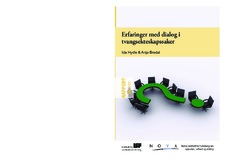| dc.contributor.author | Hydle, Ida Marie | |
| dc.date.accessioned | 2020-06-07T21:05:46Z | |
| dc.date.accessioned | 2021-04-29T13:53:50Z | |
| dc.date.available | 2020-06-07T21:05:46Z | |
| dc.date.available | 2021-04-29T13:53:50Z | |
| dc.date.issued | 2011 | |
| dc.identifier.isbn | 978-82-7894-406-6 | |
| dc.identifier.issn | 0808-5013 | |
| dc.identifier.uri | https://hdl.handle.net/20.500.12199/3356 | |
| dc.description.abstract | The Directorate of Integration and Diversity (IMDi) has Forced Marriage as one of its seven target areas. From 2008 onwards the Directorate wished to establish a better information base on forced marriage with the so called «Integration Map 2008». An action plan and a report against forced marriage have been published. IMDi then financed our research where we have looked into the experiences of the use of dialogue in cases of forced marriage which some Norwegian projects, institutions and professionals have had during the last years. More specifically we were to chart the existing knowledge and experiences with dialogue as a method in this work, possibilities as well as restrictions. This would imply indirect or direct meetings between the involved persons, e.g. parents, siblings, other relatives and the young persons being forced into an unwanted marriage. The focus should also be cases with extreme control as well as religious marriages. This report contains an overview of different dialogue perspectives as well as a short review of the different institutions which are relevant to our investigations. We then describe and analyse the different experiences, i.e. case descriptions from dialogue-oriented work, as they emerge from our qualitative interviews with different helping professionals such as the police, family therapists as well as volunteers from NGO’s working within the field, e.g. the Norwegian Red Cross, The Church City Mission, The International House in Stavanger and The Minhaj Mediation Service. In addition we describe the few Nordic and international experiences that are published within this knowledge field. There exist different objections against and arguments for the use of dialogue in such cases. We analyse the preconditions that are needed for dialogue as a method in cases with honour related violence. Our task is also to come up with recommendations and suggestions in the dialogue oriented work. Within a very short time limit we were to give advice as practical and concrete as possible for professionals and families who are looking for dialogue as a possible way out of the conflict: dialogue – and not mediation – seems best to use when focussing on the relationship between the young person and the family; it is also recommended to separate between dialogue and family related therapy dialogue is not to be related to an eventual breach in the relationship between the young person and the family; breaching family ties may be a precondition or not for a dialogue safety and security is a basic precondition for any dialogue work and it is mainly the task of the police to carry out evaluations of the threats towards the young person’s physical security. In particular it is important to take notice of the transnational family and clan ties that are often present and at work in these cases dialogues may be a direct, face – to – face, or an indirect process, where the facilitator(s) commute between the parties with direct meetings or other kinds of communication, telephone or mail etc. there are many ways to and forms of reconciliation and restoration and we recommend a deepened study of parents and siblings and their experiences with dialogues in such cases written agreements may be very valuable as one of the outcomes of dialogues. One should look for best practices with written agreements and the best formulations in the various cases. Lastly we suggest what might be useful for developing further knowledge in the field. | en |
| dc.description.abstract | Integrerings- og mangfoldsdirektoratet (IMDi) ønsket en kartlegging av kunnskap og erfaringer med dialog som metode i arbeidet mot tvangsekteskap. Dette gjelder også streng patriarkalsk kontroll eller kollektivt basert æresrelatert vold mot barn og unge. Denne rapporten belyser muligheter og begrensninger ved bruk av dialog i arbeidet med enkeltsaker og personer som er parter i konflikten. Dialog er da forstått som indirekte eller direkte møter og samtaler med de involverte partene: foreldre, søsken, andre slektninger og de unge. Rapporten bygger primært på intervjuer med ressurspersoner i ulike offentlige etater og frivillige organisasjoner. | no_NB |
| dc.publisher | Oslo Metropolitan University - OsloMet: NOVA | |
| dc.relation.ispartofseries | NOVA Rapport 27/11 | |
| dc.subject | NOVA | |
| dc.title | Erfaringer med dialog i tvangsekteskapssaker | no_NB |
| dc.type | Report | |
| fagarkivet.author.link | https://www.oslomet.no/om/ansatt/idahy | |
| fagarkivet.source.pagenumber | 126 | |
